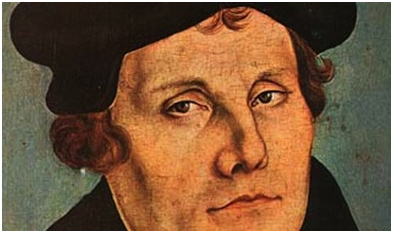Bishop Mike Rinehart
I ask not only on behalf of these, but also on behalf of those who will believe in me through their word, that they may all be one. As you, Father, are in me and I am in you,
may they also be in us, so that the world may believe that you have sent me.
– John 17:20-21
I think then that the one goal of all who are really and truly serving the Lord
ought to be to bring back to union the churches, which have at different times
and in diverse manners divided from one another.
– St. Basil the great (330 – 379), Epistle CX Ivete
 Martin Luther posted the 95 Theses on the eve of All Saints in 1517, sparking what is now known as The Reformation, a period of history that reordered the church, and to a great extent, European society. Next year, 2017, will be the 500th anniversary of this watershed moment in history. How shall we mark this milestone?
Martin Luther posted the 95 Theses on the eve of All Saints in 1517, sparking what is now known as The Reformation, a period of history that reordered the church, and to a great extent, European society. Next year, 2017, will be the 500th anniversary of this watershed moment in history. How shall we mark this milestone?
In the past Lutherans and Catholics have told the story of the Reformation in very different ways. Children on one side of the Protestant/Catholic divide grew up suspicious of the other side. Both tellings of the story were filled with truths, but which truths we choose to tell and which we choose to omit, can convey a bias. The way we tell the “facts” also matters.
Since Vatican II, Lutherans and Catholics have been in various bilateral dialogs. Dialogs began in 1965 and continue to this day. We have made significant progress along the way.
For example, in 1999, Lutherans and Catholics signed The Joint Declaration on the Doctrine of Justification in Augsburg. This document stated that Lutherans and Catholics now share a common understanding of the doctrine of justification, something that was a stumbling block in the years following the Reformation. Lutherans and Catholics agreed that their respective mutual condemnations do not apply to today’s churches. While not all Lutheran Church bodies in the world signed on, the agreement is a significant milestone.
Declaration on the Way: Church, Ministry, and Eucharist is a helpful summary of some of the agreements from the last 50+ years of dialogs. This document gathers together 32 agreements of understanding, compiled from the last 50 years of Lutheran-Catholic dialogs. Pages 9-15 give a short list of those 32 agreements. The rest of the book offers deeper commentary on these understandings.
How do we commemorate the Reformation in a way that recognizes these huge strides? How do we retell the story of the Reformation that does not rehash old polemics and set us back decades?
From Conflict to Communion is an effort to move us in the right direction. Prepared by the Pontifical Council for Promoting Christian Unity (PCPCU) and the Lutheran World Federation (LWF), this document lays out a vision for commemorating the Reformation in 2017. This may be the first centenary that takes place in the ecumenical age, and the first to have an eye towards evangelism.
How do we commemorate in a way that promotes the gospel of Jesus Christ to the world, in this global and secular context?
If you read nothing else in this book, read the third chapter. This chapter retells the story of the Reformation in a way that both Catholic and Lutheran theologians have crafted. Use it to retrain yourself to tell the story in a way that does not promote your tribe, but proclaims the hope of the world.
Here in the Gulf Coast…
In the Gulf Coast Synod we are commemorating the 500th Anniversary of the Reformation in several ways.
Serving
$500K by the 500th is an appeal to raise half a million dollars to alleviate world hunger by the 500th anniversary, October 31, 2017.
Worship
Lutherans and Catholics have agreed to commemorate the 500th by praying together in a spirit of confession and repentance. Common Prayer was prepared by Lutherans and Catholics for this 500th commemoration. It is the only common liturgy I know of prepared for and approved by both churches. Protestant and Catholic congregations will gather together for prayer on various occasions over the next year. Also, two large events have been planned:
- A prayer service will be held on Monday, October 23, 2017 at 7:00 p.m. at the Cathedral-Basilica of St. Louis in New Orleans, with Archbishop Gregory Aymond and Bishop Michael Rinehart presiding.
- A prayer service will be held on Wednesday, October 25, 2017 at 5:00 p.m. at the Co-Cathedral of the Sacred Heart in Houston, with Archbishop Daniel Cardinal DiNardo and Bishop Michael Rinehart presiding.
Both events will be a time of prayer for Protestants and Catholics together, open to the public.
Collaboration
In Houston, Catholic and Lutheran clergy gathered recently to listen to and learn from one another. Hosted by Cardinal DiNardo, this will hopefully be the first of many opportunities to discover how much we have in common. As Pope John Paul II said, “What unites us is greater than what divides us.”
Other Possibilities
Other possibilities such as lectures and service projects are being considered. The important thing is that we move forward in a spirit of mutual understanding and cooperation. We pray, as Jesus did, that the church might be one, so that the world may know the love of Christ.
We are grateful to Pastor David Roschke in Houston and Pastor Ron Unger in New Orleans for their work coordinating these efforts alongside their ecumenical counterparts.
